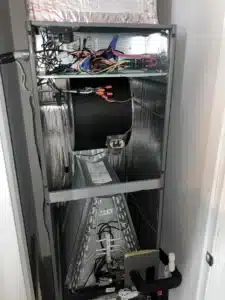The Importance of Coil Cleaning for Florida HVAC Systems
Florida HVAC systems work harder than those in almost any...
Investing in the right air conditioner is crucial for maintaining a comfortable indoor environment, especially during the scorching summer months. With various options available, choosing the most suitable air conditioning system for your home requires careful consideration of several factors. In this article, we’ll provide a factual guide to help you navigate the process of selecting an air conditioner tailored to your specific needs.
Before diving into the world of air conditioners, assess the size and layout of your home. The square footage, ceiling height, and the number of rooms are essential factors. Larger homes may require central air conditioning systems, while smaller spaces may be adequately served by ductless mini-split systems or window units.
Pay attention to the Energy Efficiency Ratio (EER) and Seasonal Energy Efficiency Ratio (SEER) ratings when evaluating air conditioner options. Higher EER and SEER ratings indicate better energy efficiency, helping you save on utility bills in the long run. Energy-efficient units not only benefit your wallet but also contribute to environmental sustainability.
There are various types of air conditioning systems, each with its own advantages and limitations. Central air conditioning is a common choice for whole-house cooling, while ductless mini-split systems offer zoned control. Window units are suitable for individual rooms, and portable units provide flexibility in cooling specific areas. Understanding the pros and cons of each type will guide your decision.
Consider the installation requirements for different air conditioning systems. Central air conditioning may require ductwork, while ductless systems offer a more straightforward installation process. Window and portable units are relatively easy to install but may not be suitable for every room layout. Assess the practicality of installation based on your home’s structure.
Regular maintenance is crucial for the longevity and efficiency of your air conditioner. Research the maintenance requirements of each type of system and consider your willingness to perform or invest in routine upkeep. Additionally, inquire about the availability of service and repair professionals for the chosen system in your area.
Evaluate the initial cost, installation expenses, and long-term operational costs of each air conditioning option. While it might be tempting to choose the least expensive unit upfront, it’s essential to weigh the overall cost against the system’s efficiency and lifespan. Consider the potential return on investment in terms of energy savings.
Different air conditioners produce varying levels of noise during operation. If noise is a concern, especially for bedrooms or living spaces, look for units with lower decibel levels. Portable and window units, in particular, may generate more noise compared to central or ductless systems.
Selecting the right air conditioning system involves a thoughtful analysis of your home’s characteristics, energy efficiency ratings, installation requirements, maintenance considerations, costs, and noise levels. By taking these factors into account, you can make an informed decision that not only meets your cooling needs but also aligns with your budget and lifestyle. Remember, the goal is to strike a balance between comfort, efficiency, and practicality for a cooling solution that stands the test of time.

Florida HVAC systems work harder than those in almost any...

Indoor air quality plays a major role in how a...

Ventilation is one of the most important yet often overlooked...

In Florida, air conditioning is not a luxury. It is...

Many homeowners assume that central air conditioners pull fresh air...

Preventive AC maintenance plays a major role in keeping cooling...